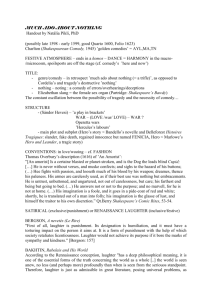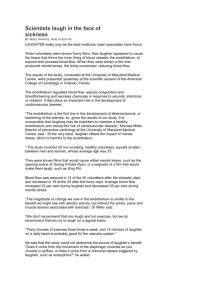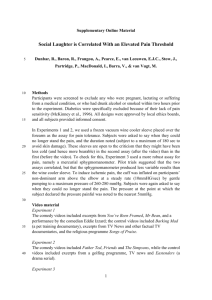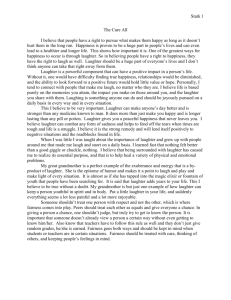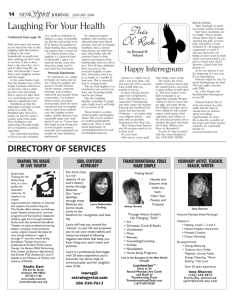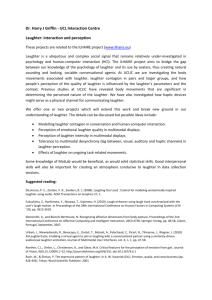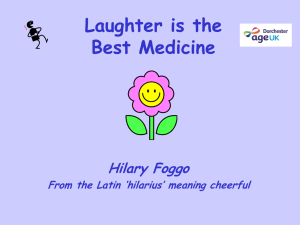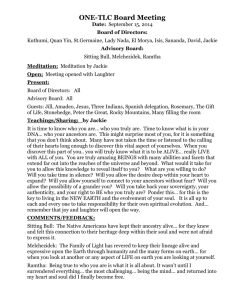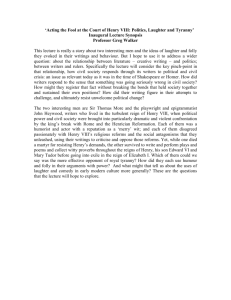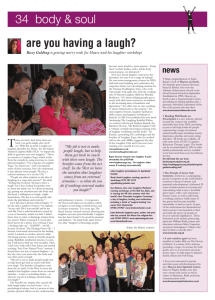Handout 1
advertisement
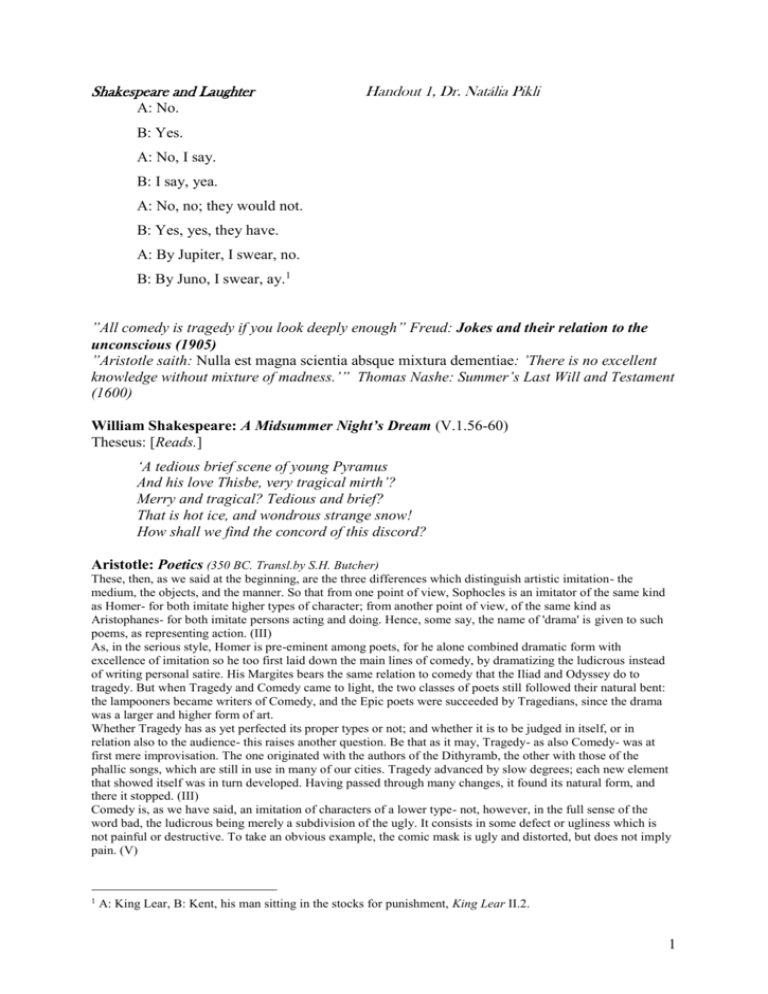
Shakespeare and Laughter Handout 1, Dr. Natália Pikli A: No. B: Yes. A: No, I say. B: I say, yea. A: No, no; they would not. B: Yes, yes, they have. A: By Jupiter, I swear, no. B: By Juno, I swear, ay.1 ”All comedy is tragedy if you look deeply enough” Freud: Jokes and their relation to the unconscious (1905) ”Aristotle saith: Nulla est magna scientia absque mixtura dementiae: ’There is no excellent knowledge without mixture of madness.’” Thomas Nashe: Summer’s Last Will and Testament (1600) William Shakespeare: A Midsummer Night’s Dream (V.1.56-60) Theseus: [Reads.] ‘A tedious brief scene of young Pyramus And his love Thisbe, very tragical mirth’? Merry and tragical? Tedious and brief? That is hot ice, and wondrous strange snow! How shall we find the concord of this discord? Aristotle: Poetics (350 BC. Transl.by S.H. Butcher) These, then, as we said at the beginning, are the three differences which distinguish artistic imitation- the medium, the objects, and the manner. So that from one point of view, Sophocles is an imitator of the same kind as Homer- for both imitate higher types of character; from another point of view, of the same kind as Aristophanes- for both imitate persons acting and doing. Hence, some say, the name of 'drama' is given to such poems, as representing action. (III) As, in the serious style, Homer is pre-eminent among poets, for he alone combined dramatic form with excellence of imitation so he too first laid down the main lines of comedy, by dramatizing the ludicrous instead of writing personal satire. His Margites bears the same relation to comedy that the Iliad and Odyssey do to tragedy. But when Tragedy and Comedy came to light, the two classes of poets still followed their natural bent: the lampooners became writers of Comedy, and the Epic poets were succeeded by Tragedians, since the drama was a larger and higher form of art. Whether Tragedy has as yet perfected its proper types or not; and whether it is to be judged in itself, or in relation also to the audience- this raises another question. Be that as it may, Tragedy- as also Comedy- was at first mere improvisation. The one originated with the authors of the Dithyramb, the other with those of the phallic songs, which are still in use in many of our cities. Tragedy advanced by slow degrees; each new element that showed itself was in turn developed. Having passed through many changes, it found its natural form, and there it stopped. (III) Comedy is, as we have said, an imitation of characters of a lower type- not, however, in the full sense of the word bad, the ludicrous being merely a subdivision of the ugly. It consists in some defect or ugliness which is not painful or destructive. To take an obvious example, the comic mask is ugly and distorted, but does not imply pain. (V) 1 A: King Lear, B: Kent, his man sitting in the stocks for punishment, King Lear II.2. 1 What is comic? The theories of laughter and the comic MAN’S CORK LEG CHEATS DEATH Keeps Him Afloat After Leap Into River A carpenter’s cork leg kept him afloat and prevented him from taking his life by jumping into the Mississippi river from a Canal St. ferry, Fourth District police reported Monday. Taken to Charity hospital after his rescue was Jacob Lewis, Negro, 52, 2517 Annette. Suffering from a possible skull fracture and internal injuries, he was placed in a psychiatric ward for examination. Police said that after his release from the hospital he would be booked for disturbing the peace by attempting to commit suicide. The incident occurred about 11:25 p.m. Sunday while the ferry, M.P.Crescent was tied up on the Algiers side of the river. Police quoted a ferry passenger as saying he saw the man leap from a rest room window into the water. When the call was sounded, two employes, James McCaleb, 43, 709 Wilks Lane, and Edward Johnson, 54, 2113 Whitney, Algiers, both Negroes, lowered a boat and rescued Lewis. He was brought into the boat about 100 yards from the ferry after he refused to grab life preservers the men threw him. Ferry employes said he told them he had no desire to live. His attempt on his life might have succeeded if his cork leg had not kept him afloat, police said. (New Orleans Times-Picauyne, qt. in Comedy. Meaning and Form. Ed. By R.W. Corrigan, San Francisco, Chandler Publ., 1965. 1.) Longman def. ”laugh 1. to laugh because sg is funny 2. because you are enjoying yourself ” Key words: strange, incongruous, excess, exaggeration, mistake, purposeless, inconsequence, irrational, nonsense, self-contradiction (are these all comic phenomena?) Theories – defined by the author/age/decorum, etc. + diff. loci for potential humour – diff. interpretations (in the text/response/physiological causes and effects/social interaction, etc.) Renaissance: physiological (health-restorative) and didactic purposes prevail Physiological approach – comes from the senses (the memory or sg by sight, sound), producing blood, dissipating melancholy and pressure, renewing, restrengthening the mind (Quintilian), deep breath (but also! can lead to death, Aretino, Rabelais) Philosophical character – Aristotle, Democritus, Pliny about Zoroaster – a sign of humanity and maturity, n.b. ’divine wisdom’, freedom of the spirit, Middle Ages: man as risus capax reconciling angel and beast Ritual character – life force manifest, vitality, fertility (S. Langer) restorative, healthinducing – homeopathic magic: agelastos ’unlaughing’=barren, dry (cf. Demeter losing Persephone) Superiority theories – Hobbes, Bergson (Le Rire/Laughter: An Essayon the mening ofthe Comic, 1900) – homme-automatons, mechanical and corrective laughter (Moliere) – in relation with Elizabethan comic theory (cf. Sidney): the lesson to be gained, ethically, philosophically, for orators/rhetorical purposes – to buttonhole the audience 2 Incongruity theories - expectations upset, incongruous linkages, forced to see new possibilities ’release from restraint’ theories – safety valve of psychic energy, tendentious, aggressive wit (Freud), triumph of instict above intellect (Kris), every body can laugh (also etologists, Desmond Morris) Carnivalesque laughter – (Mikhail Bakhtin) ambivalent (destructive and liberating), degrading the sacred; festive, communal, universal, topsy-turvydom, transgression of bodily/spatial/hierarchical/linguistic barriers, ’licensed misrule’ • BAKHTIN […] a festive laughter […] not an individual reaction to some isolated ’comic’ event […] Carnival laughter is the laughter of all the people […] universal in scope; it is directed at all and everyone, including the carnival’s participants […] the entire world is seen in its droll aspect, in its gay relativity[…] this laughter is ambivalent: it is gay, triumphant, and at the same time mocking, deriding. It asserts and denies, it buries and revives. DRINK/WINE-SACK/BLOOD/LUGHTER FALSTAFF as described by HAL:”Thou art so fat-witted, with drinking of old sack and unbuttoning thee after supper and sleeping upon benches after noon” • Laurent Joubert Traité du ris (1579, Paris): “that same moist heat which accompanies copious blood makes us inclined to laughter [...] it is clear that a propensity to laughter and an excess of grease come from the same source.” A brief case study: Much Ado About Nothing • self-chosen artificial fools (Beatrice and Benedick) – fear/protecting the self and laughter • Dogberry – grotesque/scaled-down version of Bottom - ass/coxcomb • ‘Corrective’ merriment – correcting deviation from the norm: Don Pedro et al. gulling Beatrice and Benedick (film clip from Kenneth Branagh’s 1993 film – manifold reception: what do we laugh at? Sympathetic or mocking? On/off stage laughter) • Welt-Verlachung: the great villain’s laughter (Don John) DOGBERRY God's my life, where's the sexton? let him write down ’the Prince's officer coxcomb’. Come, bind them. Thou naughty varlet! CONRADE Away! you are an ass, you are an ass. DOGBERRY Dost thou not suspect my place? dost thou not suspect my years? O that he were here to write me down an ass! But, masters, remember that I am an 3 ass; though it be not written down, yet forget not that I am an ass. (Much Ado About Nothing 4.2. 67-75.) • Thomas WILSON (Art of Rhetorick): The occasion of laughter, and the meane that maketh vs mery (which is the second obseruation) is the fondnes, the filthines, the deformitie, and all such euill behauiour, as we see to be in other. For we laugh alwaies at those things, which either onely or chiefly touch handsomely, and wittely, some especiall fault, or fond behauiour in some one body, or some one thing. Somtimes we iest at a mans bodie, that is not well proportioned, and laugh at his countenance, if either it be not comely by nature, or els he through folly can not well see it. TITLE PAGES – MARK THE SHIFT! + laughter as having marketing value / signalling low taste; quarto (cheap, mass edition) vs folio (prestigious, expensive) – targeting what reader? GENRES: comedy – ’the catastrophe is a nuptial’ (Love’s Labour’s Lost) 1608 Pied Bull quarto of King Lear: ’the sullen and assumed humor of TOM of Bedlam’ – highlighted piece of advertisment: madness as source for humour Henry IV, Part 1, Quarto 1598 mentioning King Henry IV, Percy and in a separate, highlighted position: ’the merry conceited humours of Sir John Falstaff’ as opposed to the title in the Folio, 1623: The First Part of Henry the Fourth, / with the Life and Death of HARRY surnamed HOT-SPURRE’ 1661: The Merry Conceited Humours of Bottom the Weaver (’spin-off’) 4
